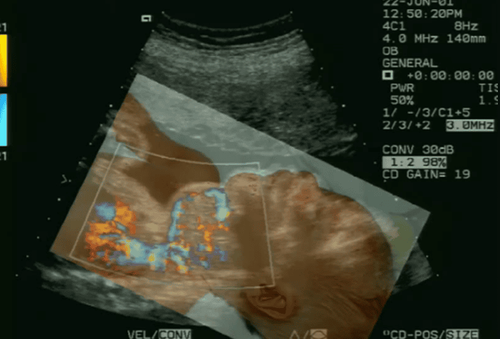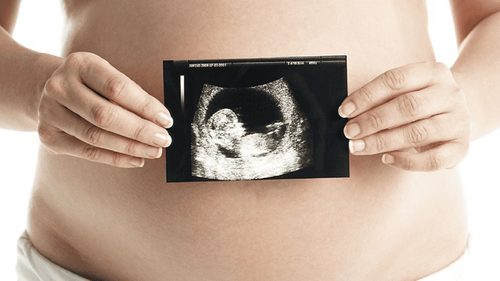This is an automatically translated article.
Article by Doctor Vo Ta Son - Doctor of Fetal Medicine - Women's Health Center, Vinmec Times City International General Hospital.
1. What is fetal goitre?
Fetal goiter is bulging of the anterior part of the fetal neck due to enlargement of the thyroid gland.2. Why does the fetus have goiter?
Fetal goiter is a very rare condition with an incidence of 1/50,000-1/30,000 during pregnancy. An underactive fetal thyroid gland (congenital hypothyroidism) is the most common cause of fetal goiter. This can also happen to a fetus with an overactive thyroid gland (congenital hyperthyroidism) and even to a fetus with normal thyroid function (this is less common).The fetus may have an underactive or overactive thyroid gland due to the mother's diet lacking iodine or the mother taking antithyroid drugs, or the mother having antithyroid antibodies (Graves' disease) that will attack her thyroid gland. fetus. In healthy mothers, the baby will sometimes also have problems with the production, storage, or metabolism of thyroid hormone, or deficiency of thyroid hormone receptors. Genetic diseases can also lead to fetal goiter.
3. What complications or other problems are associated with fetal goiter?
When the thyroid tumor is large, it will cause complications that compress the fetal trachea, making it difficult for the fetus to swallow, leading to polyhydramnios. If there is concern that a goiter may compress the baby's windpipe at birth, a cesarean section is recommended to ensure that the baby can breathe before clamping the umbilical cord (EXIT procedure). Fetal goiter increases the risk of heart failure, low birth weight, growth retardation, slow or fast fetal heart rate, and problems with bone development. There is also an increased risk of infant mortality.

4. What tests do I need and how will my baby be treated?
Fetal blood sampling (taking blood from the fetal umbilical cord with a fine needle) to measure the exact thyroid hormone levels in the fetus to determine the fetal thyroid gland is underactive or overactive. If thyroid hormone levels are too low, the doctor may inject thyroid hormone into the amniotic fluid so that the baby can receive the medicine by swallowing the amniotic fluid. In some cases, these injections are given weekly, but in other cases, only one or two injections are needed. If thyroid hormone levels are too high, you will be given antithyroid medication and the medicine will be delivered across the placenta. In most cases, this treatment will shrink the goiter during pregnancy.
5. How will the pregnancy continue to be managed?
You will have more frequent ultrasounds to check the fetal growth and the enlargement of the goiter as well as the fetal health. To prepare for delivery, consultation with a neonatologist, an endocrinologist, an otolaryngologist, and a paediatrician is required.
6. What will the baby be like after birth?
If the cause of the goiter is hypothyroidism and the treatment is not timely, the child may have growth retardation and deafness. However, with early treatment and continued postpartum (about 1 month on average) the baby will develop normally.
|
Tôi nên hỏi những câu hỏi nào? ∙ Tôi cần siêu âm bao lâu một lần? ∙ Có cần phẫu thuật trong thai kì hay không? ∙ Có lợi ích gì khi em bé được phẫu thuật trong bụng mẹ? ∙ Khi nào có thể sinh? ∙ Nơi nào có thể cung cấp dịch vụ chăm sóc tốt nhất cho em bé sau sinh? ∙ Tôi có thể gặp trước đội ngũ bác sĩ sẽ hỗ trợ em bé khi nó được sinh ra? |
Please dial HOTLINE for more information or register for an appointment HERE. Download MyVinmec app to make appointments faster and to manage your bookings easily.














